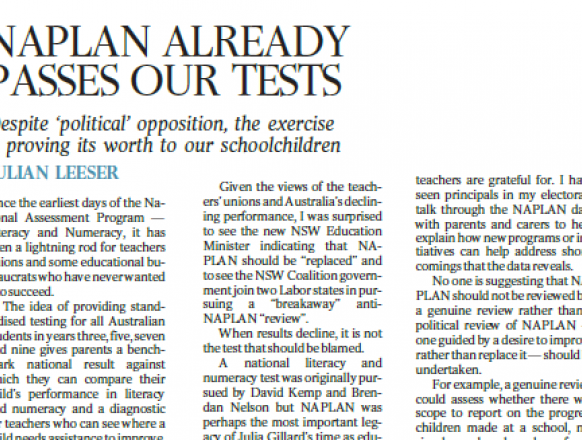Since the earliest days of NAPLAN, it has been a lightning rod for teachers’ unions and some educational bureaucrats who have never wanted it to succeed.
The idea of providing standardised testing for all Australians students in years three, five, seven and nine gives parents a bench mark national result against which they can compare their child’s performance in literacy and numeracy and a diagnostic for teachers who can see where a child needs assistance to see them improve.
When NAPLAN was introduced it filled a gaping hole in Australian education. Never before had there been a nationally consistent way of measuring some of the most fundamental skills children need to learn at school. Not every important skill is measured, but it is hard to dispute the value of knowing whether or not children are meeting literacy and numeracy benchmarks.
At a time when Australia is being beaten in international testing by countries like Kazakhstan and Slovenia, you’d think a standardised test which shows where improvements are needed was more important than ever.
But that has never been the view of the teacher’s union. They have always seen NAPLAN as a threat. In 2010, the NSW Teachers Federation banned teachers from delivering NAPLAN. Some radical Victorian unionists are now threatening to boycott the tests altogether. More recently it has come to light that a sub-branch of the AEU has claimed the “breakaway” review as fruit of their lobbying efforts.
Given the views of the teachers unions and Australia’s declining performance, I was surprised to see the new NSW Education Minister indicating that NAPLAN should be “replaced” and to see the NSW Coalition Government join with two Labor states in pursuing a “breakaway” anti-NAPLAN “review”.
When results decline, it is not the test that should be blamed.
A national literacy and numeracy test was originally pursued by David Kemp and Brendan Nelson but NAPLAN was perhaps the most important legacy of Julia Gillard’s time as Minister for Education.
Over 4.6 million children have taken NAPLAN tests since the program started in 2008. Australia has received useful and important data about how children are performing against some important key indicators.
Before NAPLAN, we didn’t know how significantly educational progress can differ from state-to-state. We also wouldn’t have known how successful a number of schools have been in improving literacy rates of children whose first language is not English. The information NAPLAN gives us helps us make better decisions about where more energy needs to be focussed and indicates where there are successes to learn from.
NAPLAN is not something that students relish. But testing people against standards is not just a part of the education system it is a part of life. And regular standardised testing is important practice for the HSC especially when NSW has already done away with the School Certificate.
If we lose NAPLAN we lose a rich source of information that parents, policy-makers, and many teachers, are grateful for. I have seen principals in my electorate talk through the NAPLAN data with P&Cs to help explain how new programs or initiatives can help address shortcomings that the data reveals.
No one is suggesting that NAPLAN should not be reviewed but a genuine review rather than a political review of NAPLAN—one guided by a desire to improve rather than replace it— should be undertaken.
For example a genuine review could assess whether there is scope to report on the progress children make at a school, not simply on benchmark performance. The Unique Student Identifier that was announced last year will help make that sort of improvement possible. It will allow a child’s results to be tracked even if the child moves interstate, so that their progress can be properly evaluated.
This sort of improvement would give richer data to show where really exceptional teaching and learning is happening and where children are not making the progress that they ought.
The Federal Minister for Education, Dan Tehan, has voiced no opposition to the idea of a review, only to the timeliness of reviewing NAPLAN prematurely especially when reviews are already taking place into NAPLAN online and the My School website.
It is therefore hard to see any good reason for the breakaway review to occur.
By jumping the gun and conducting a breakaway NAPLAN review, the New South Wales, Queensland and Victorian Education Ministers are knee-capping the prospect of a future considered, useful review, involving all stakeholders.
And worse, they are reigniting yet another educational row that will damage rather than enhance the quality of education children receive across Australia.
The warm welcome the breakaway review has received from the earliest and loudest critics of NAPLAN, should be a reason for caution, rather than cheer.
Julian Leeser is the Federal Member for Berowra. He was chair of the Government’s education committee 2018-2019




